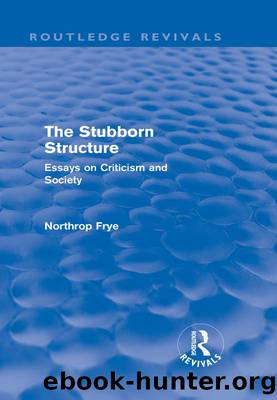The Stubborn Structure by Frye Northrop;

Author:Frye, Northrop;
Language: eng
Format: epub
ISBN: 1111714
Publisher: Taylor & Francis Group
10 THE ROAD OF EXCESS
It will be easiest for me to begin with a personal reference. My first sustained effort in scholarship was an attempt to work out a unified commentary on the prophetic books of Blake. These poems are mythical in shape: I had to learn something about myth to write about them, and so I discovered, after the book was published, that I was a member of a school of âmyth criticismâ of which I had not previously heard. My second effort, completed ten years later, was an attempt to work out a unified commentary on the theory of literary criticism, in which again myth had a prominent place. To me, the progress from one interest to the other was inevitable, and it was obvious to anyone who read both books that my critical ideas had been derived from Blake. How completely the second book was contained in embryo in the first, however, was something I did not realize myself until I recently read through Fearful Symmetry, for the first time in fifteen years, in order to write a preface to a new paperback edition. It seems perhaps worth while to examine what has been so far a mere assumption, the actual connecting links between my study of Blake and my study of the theory of criticism. At least the question is interesting to me, and so provides the only genuine motive yet discovered for undertaking any research.
Blake is one of the poets who believe that, as Wallace Stevens says, the only subject of poetry is poetry itself, and that the writing of a poem is itself a theory of poetry. He interests a critic because he removes the barriers between poetry and criticism. He defines the greatest poetry as âallegory addressed to the intellectual powersâ, and defends the practice of not being too explicit on the ground that it ârouzes the faculties to actâ. His language in his later prophecies is almost deliberately colloquial and âunpoeticâ, as though he intended his poetry to be also a work of criticism, just as he expected the criticâs response to be also a creative one. He understood, in his own way, the principle later stated by Arnold that poetry is a criticism of life, and it was an uncompromising way. For him, the artist demonstrates a certain way of life: his aim is not to be appreciated or admired, but to transfer to others the imaginative habit and energy of his mind. The main work of criticism is teaching, and teaching for Blake cannot be separated from creation.
Blakeâs statements about art are extreme enough to make it clear that he is demanding some kind of mental adjustment to take them in. One of the Laocoon Aphorisms reads: âA Poet, a Painter, a Musician, an Architect: the Man Or Woman who is not one of these is not a Christianâ. If we respond to this in terms of what we ordinarily associate with the words used, the aphorism will sound, as Blake intended it to sound, like someone in the last stages of paranoia.
Download
This site does not store any files on its server. We only index and link to content provided by other sites. Please contact the content providers to delete copyright contents if any and email us, we'll remove relevant links or contents immediately.
The Power of Myth by Joseph Campbell & Bill Moyers(936)
Half Moon Bay by Jonathan Kellerman & Jesse Kellerman(920)
A Social History of the Media by Peter Burke & Peter Burke(886)
Inseparable by Emma Donoghue(853)
The Nets of Modernism: Henry James, Virginia Woolf, James Joyce, and Sigmund Freud by Maud Ellmann(772)
The Spike by Mark Humphries;(730)
A Theory of Narrative Drawing by Simon Grennan(712)
The Complete Correspondence 1928-1940 by Theodor W. Adorno & Walter Benjamin(711)
Ideology by Eagleton Terry;(665)
Bodies from the Library 3 by Tony Medawar(656)
World Philology by(649)
Culture by Terry Eagleton(648)
Farnsworth's Classical English Rhetoric by Ward Farnsworth(647)
Adam Smith by Jonathan Conlin(618)
A Reader’s Companion to J. D. Salinger’s The Catcher in the Rye by Peter Beidler(616)
Game of Thrones and Philosophy by William Irwin(604)
High Albania by M. Edith Durham(598)
Comic Genius: Portraits of Funny People by(588)
Monkey King by Wu Cheng'en(581)
